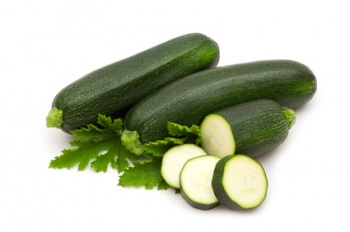Zucchini
From Wikiwel
The zucchini or courgette is a summer squash which can reach nearly a meter in length, but which is usually harvested at half that size or less. Along with certain other squashes and pumpkins, it belongs to the species Cucurbita pepo. Zucchini can be dark or light green. A related hybrid, the golden zucchini, is a deep yellow or orange color. In a culinary context, the zucchini is treated as a vegetable, which means it is usually cooked and presented as a savory dish or accompaniment. Botanically, however, the zucchini is a fruit, being the swollen ovary of the zucchini flower. The zucchini or courgette originates from Italy.
See also :
Special Precautions of Zucchini
Benefits and uses of Zucchini are
- Vitamin C : Zucchini serves as a good source of vitamin C. A water-soluble antioxidant, vitamin C dissolves in your body fluids and protects your cells from free radicals, which are highly reactive compounds that oxidize your DNA, lipids and proteins, causing cellular damage. Getting enough vitamin C in your diet also aids in nerve cell communication, helps your body metabolize cholesterol and keeps your tissues strong. A cup of chopped zucchini contains 22 milligrams of vitamin C, which is 24 percent of the recommended daily intake for men and 29 percent for women, set by the Institute of Medicine.
- Lutein and Zeaxanthin : Zucchini also provides you with lutein and zeaxanthin, two phytonutrients that belong to the carotenoid family, which is the same nutrient family that includes beta-carotene, a source of vitamin A. Lutein and zeaxanthin promote healthy eyesight. They filter light rays as they enter your eye, helping to ensure that harmful rays can't damage your eye tissues. While, as of September 2013, the Institute of Medicine has not set a recommended daily intake for lutein and zeaxanthin, the American Optometric Association notes that intakes of at least 6 milligrams per day can reduce your risk for age-related macular degeneration, an eye disease that causes blindness. A cup of chopped zucchini provides 2.6 milligrams of lutein and zeaxanthin, or 43 percent of this intake goal.
- Manganese : Consuming zucchini also boosts your intake of manganese, an essential mineral. Like vitamin C, manganese protects your tissues from harmful free radicals. It supports the function of glycosyltransferases, a family of proteins that promote healthy bone tissue development. Manganese also helps your body produce collagen essential for efficient wound healing. Each cup of chopped zucchini boasts 0.22 milligram of manganese. This provides 12 and 10 percent of the Institute of Medicine's recommended daily intake for women and men, respectively.
- Diet : One cup of zucchini has 36 calories and 10% of the RDA of dietary fiber, which aids in digestion, prevents constipation, maintains low blood sugar and curbs overeating.
- Lower Cholesterol : The dietary fiber in zucchini helps lower cholesterol by attaching itself to bile acids that the liver makes from cholesterol for digesting fat. Because fiber binds so well with bile acid, thus crowding its ability to immediately digest fat, the liver is charged with producing more bile acid.The liver then draws upon even more cholesterol to produce bile acid, consequently lowering the overall cholesterol level in the body. Furthermore, the high levels of vitamin C and vitamin A prevent cholesterol from oxidizing in the body's blood vessels, thus hampering the onset of atherosclerosis.
- Cancer Prevention : Because dietary fiber promotes healthy and regular bowel movements, the high amounts of fiber in zucchini also help prevent carcinogenic toxins from settling in the colon. Moreover, the vitamins C and A, as well as folate, found in zucchini act as powerful antioxidants that fight oxidative stress that can lead to many different types of cancer.
- Prostate Health : Studies show that the phytonutrients in zucchini aid in reducing the symptoms of benign prostatic hypertrophy (BOH), a condition in which the prostate gland enlarges and leads to complications with urination and sexual functions in men.
- Anti-Inflammatory : Vitamins C and A not only serve the body as powerful antioxidants, but also as effective anti-inflammatory agents. Along with the copper found in zucchini, these vitamins deter the development of many hyper-inflammatory disorders, including asthma, osteoarthritis, and rheumatoid arthritis.
- Heart Attack and Stroke Prevention : A one cup serving of zucchini contains over 10% of the RDA of magnesium, a mineral proven to reduce the risk of heart attack and stroke. Zucchini also provides folate, a vitamin needed to break down the dangerous amino acid homocysteine, which - if levels in the body shoot up - can contribute to heart attack and stroke.
- Lower Blood Pressure : Along with magnesium, the potassium found in zucchini helps lower blood pressure. If unchecked, hypertension, or high blood pressure, can lead to arteriosclerosis (blood vessel damage), heart attack, stoke, and many other serious medical conditions. Both the potassium and magnesium in zucchini, however, can help alleviate the stress on the body's circulatory system.
